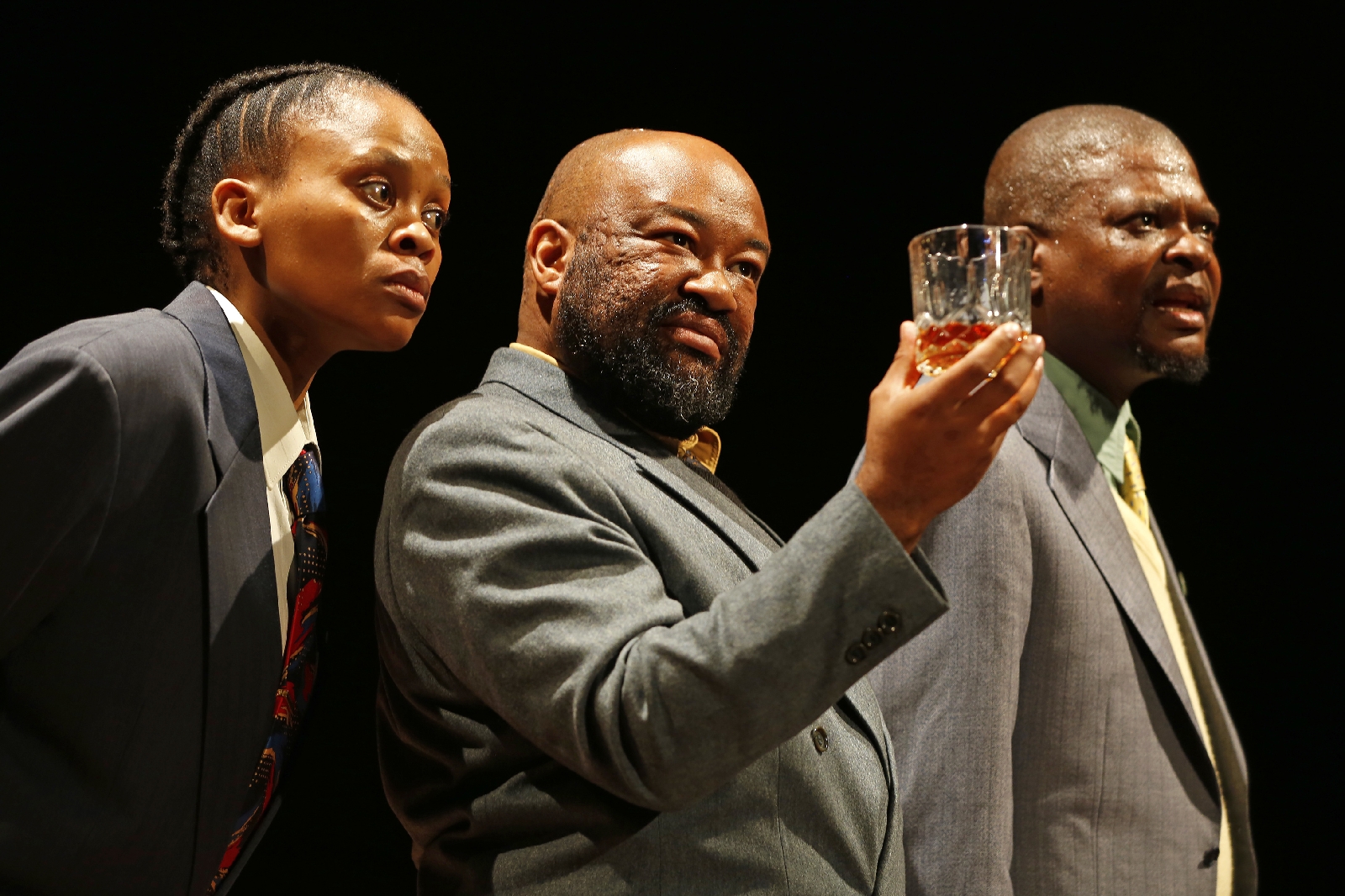Khongolose Khommanding Khommissars shines the theatrical spotlight on corruption and other political shenanigans
The overture is
reminiscent of modern struggle songs that mirror apartheid-era liberation
chants. The stage set is really simple, with one elegantly upholstered bench
and an oak-like puzzle on the floor and wall. One puzzle piece lies outside the
carpet - a misplaced piece that suggests that something is missing. This
theatre presentation suggests that justice for the poor is that missing piece. A
door lit on the far right hand side of the wall serves as a wine and liquor
storage.
Tsebo Rapoo as Tshireletso Nkoane, Lebogang Motaung as Qiniso Nxumalo and Xolile Gama as Ronald Mulaudzi. Pic by Mark Wessels.
Khongolose
Khommanding Khommissars - a stage work written by J Bobs Tshabalala, the
Standard Bank Young Artist Award Winner for Theatre 2020 - is directed by
Theatre Duo, Mahlatsi Mokgonyana and Billy Langa, assisted by Ketsia Velaphi.
The show is being performed at the Market Theatre's main John Kani Theatre.
This thought-provoking political satire is artistically brought to life by
Denis Hutchinson's stunning set and lighting design, as well as Lethabo
Bereng's costumes and decor. The script's complexities are skillfully portrayed
by cast members Lebohang Motaung as QINISO NXUMALO, Moagi Kai as MXOLISI
MTHEMBU, Xolile Gama as RONALD MULAUDZI, Tshireletso Nkoane as TSEBO RAPOO, and
Anelisa Phewa as SQALO HOKO.
The uncommon and
unique curtain speech - a brief speech made through voice-over immediately
following a performance, generally in front of the stage's closed curtains - is
delivered in a politically-charged tone. The words 'This revolutionary act cannot be aired' are heard before the
lights enchant the audience.
The tone on stage
is contrasted with a display on the wall of a quotation by Franz Fanon
regarding bourgeoisie. A confident stride by a black man wearing a white mask
is followed by two people dressed in high-end clothes and well-polished shoes.
They are holding a 'diplomatic rhetoric' concert to honour their 'induna
cadre,' not hiding their concerns about losing their riches. They declare from
the start that they will not return to poverty. Smuts Ngonyama, a former ANC
spokesperson, stated that he "didn't struggle to be poor" almost two
decades ago when defending his participation in a Telkom BEE share program that
would have won him up to R160 million after the sale of the government's
shares.
In Khongolose
Khommanding Khommissars, Tshabalala scrutinizes the political landscape, an
intricate web of corruption by political office bearers in his homeland, using
the same postcolonial magnifying glass that Ngugi wa Thiong'o used in his novel
Wizard of The Crow.
Though the story is
set in an imagined Free Republic of Aburiria, the characters in wa Thiong'os' novel
bear unmistakable resemblances to African politicians in today's South Africa,
who ply their trade in defending and protecting each other’s corruption and all
manner of corrupt shenanigans. Tshabalala provides us with four men willing to
go to any length - in the terminology of the current political milieu - to
launch young innocent future leaders into looting the state coffers. There is
no difference in wa Thiong'o's tale, where a trio of ridiculous ministers whose
sycophancy extends to bizarre body modification - each consenting to surgically
enlarge his eyes, ears, or tongue, all the better to spot the Ruler's political
adversaries, overhear their conspiracies, or spread his influence. By hook or
crook, the four men are defending their Commander.
These four men are
not ordinary citizens, but rather decorated veterans. Fluent in cadre language
with poetic rhythmic vocabulary, their goal is to feed their potbellies rather
than the poor and oppressed. They had a plan to bring in a new cub to help them
with their looting. An eagle in flight is projected on the wall, which is
interconnected with a framed artwork of Mr Nxumalo that resembles the Dutch
painting masters. The investigator or journalist is invited into his home and
urged to dismiss the allegations, but is informed that the objective is to
incorporate him into the system. Mr Sxalo Hoko initially refulsed to become
entangled in the rot, but he was eventually connived into the system. This was made feasible by the purchase of
chocolate and flowers for his wife Zoleka. He was appointed Chief of
Intelligence. I'd like to limit my domain's touchability.
The performance
also features the Honourable Rikhotso, Minister of Tendepreneurs, who is said
to be kind to fellow looters. This man eats for himself as well as for them. He
is described as a dependable con artist. These authorities are constantly
scared of the word 'lezenke,' which denotes poverty. It is written somewhere
that "it takes a village to avoid the life of a squatta." Their inventiveness
inspires them to devise new ways to plunder the state, such as the Umsombovu
Youth Fund initiative, which was created to empower South African youth back in
2001.
As the 90-minute
performance comes to a close, a young, naive, and sharp figure portrayed by
Moagi Kai emerges; we are told that he is from the movement's lower structures.
He is greeted by Mr Hoko, who is now well-versed in the "system." For
a time, we are led on a voyage through how elder politicians poison the
youthful blood, resulting in improved but weak leaders for the future. This
master piece will have you wanting to watch it over and over again. There isn’t
a single moment when you feel bored while viewing it.
The play opened on
the 26th July and will conclude on 13th August 2023. To make block bookings
and enquire about discounts please contact Anthony Ezeoke 011 832 1641ext 203/
083 246 4950
For further
information, interviews and images, contact:
Acting Brand and
Communications Manager: Lusanda Zokufa 072 367 7867 or lusandaz@markettheatre.co.za






A great and comprehensive take on the play. The play left me asking for some more. Thanks for the review.
ReplyDeleteThank you so much. I am so much you enjoyed the review and the play altogether.
Delete